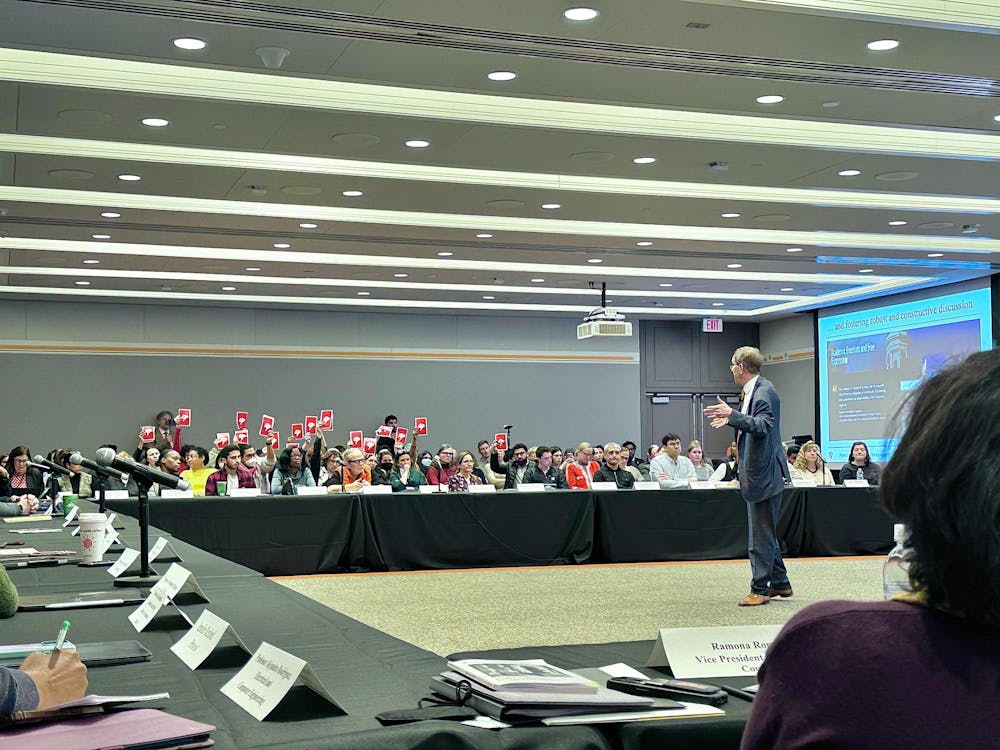When students received notice yesterday that the University will be eliminating independent dining and requiring most students to purchase meal plans, many of us felt blindsided. Here was the University making a monumental decision about an issue essential to student life with minimally visible student input.
Later that day, I attended the Council of the Princeton University Committee (CPUC) meeting, one of the University’s most meaningful opportunities for students to connect with administrators who make the decisions. The meeting is held six times a year and serves as “a permanent conference of the representatives of all major groups of the University where they could raise problems that concern them and … be exposed to each other’s views.” While its description of the event and its representative constituents implied a kind of democratic model of ideal exchange, the meeting mostly functioned as a Q&A, the decision already made, and the damage already done.
In a time of stark concern for all those with remaining hope for democratic principles, Princeton has successfully remained a defensive bulwark — at least, that’s the kind of optimism that a plethora of Princeton students have put their faith in. The recent Frosh Survey indicated that nearly 40 percent of members of the Class of 2029 were either “somewhat” or “strongly” positively impacted by President Eisgruber’s “stance against the Trump administration and its role in higher education.” Last April, my colleagues Jerry Zhu ’27 and Preston Ferraiuolo ’26 lauded President Eisgruber’s leadership, gravitas, and defense of free speech principles amid national pressures in their column.
Upon a more critical examination of supposedly democratic processes such as the CPUC, it becomes increasingly clear that at its core lies a contrived performativity. In engaging in this performance to its students, the University clearly acknowledges that there is some value to engaging in a democratic system of governance. And yet it does not tangibly accomplish that goal. To make this performance real, it must begin by ensuring that an institutional, non-performative democracy exists at the University in the first place.
One simple way to do this is to make CPUC a decision-making body that votes on student referenda. A recent column in our section aptly describes the current issues with student referenda, which poll the undergraduate student body on proposed University policy changes such as fossil fuel divestment and often garners overwhelming support. The piece argued that the lack of administrative power that student referendums hold should incentivize USG to set “more modest goals for policy requests.”
Of course, compromise and respectful dialogue are important tenets of any democratic system. But they exist only under the pretense of ideologically opposed groups having matched political agency. If a group’s referendum lives or dies by its acceptability to a governing body where it has little input, then that compromise is not the result of a democratic process but rather a procedural concession resulting from a lack of agency.
Others in the publication have argued that democratization is wholly unnecessary, likely more in line with University President Christopher Eisgruber ’83 beliefs characterizing students’ administrative power as an unworthy goal: the “fact that [a student is] here today … doesn’t mean [their] views about [the university] should be the deciding views about what happens,” he said.
All of these perspectives fundamentally mischaracterize either the purpose of democratic processes at a university or the dire necessity for an institution like Princeton to practice them. To say that it shouldn’t be within a student body’s rights or interests to invest in University affairs because of their temporary stay is like saying that no citizen should be allowed to vote because nobody lives in a country forever.

Albeit for a transitory period, we all exist as stakeholders in the University community. It is within all of our interests — students, administrators, and professors alike — to participate in the creation of a better Princeton, even if we won’t be there to live its effects. This is precisely why University democratization is important and necessary: While each class of students can’t live the everlasting effects of their administrative participation, they are still the best representatives of future students, and the future students will always be an eternally relevant stakeholder.
And such a concern, if anything, should make democratization more appealing — it can represent the evolving interests of the group that a political entity serves. And while I am deeply deferential to my professors, intellectual savvy should not be a prerequisite for political participation. And a university’s intellectual authority, which I am more than thrilled to submit to, is distinguishable from its administrative and procedural authority in any case.
Another method through which Princeton can assist the democratization is by abolishing the policy of submitting questions to the CPUC days in advance. If a university is systematically averse to questioning by its constituents that put them to scrutiny, it is failing to live up to its commitments to viewpoint diversity and the fostering of difficult conversations that it claims to care so much about. While the ability to ask questions alone would not be a sufficient mode of democratization, it would serve as a stepping stone to make political events and participation at Princeton more reflective of its institutional values.
It is unimaginably easy to perform democracy. It is also unimaginably easy, as recent national political shifts have demonstrated, to weaponize the pretense of democracy in the service of undemocratic ends. Princeton owes it to its constituents to practice democracy not merely as performance, but as principle.

Siyeon Lee is an associate Opinion editor from Seoul, South Korea, majoring in History. She believes that she owes much of her life’s privileges to democratic movements and student activism. She can be reached at siyeonlee[at]princeton.edu.








